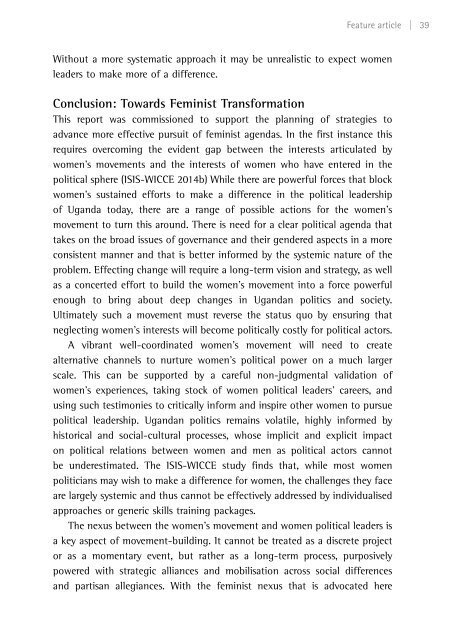Create successful ePaper yourself
Turn your PDF publications into a flip-book with our unique Google optimized e-Paper software.
Feature article | 39<br />
Without a more systematic approach it may be unrealistic to expect women<br />
leaders to make more of a difference.<br />
Conclusion: Towards Feminist Transformation<br />
This report was commissioned to support the planning of strategies to<br />
advance more effective pursuit of feminist agendas. In the first instance this<br />
requires overcoming the evident gap between the interests articulated by<br />
women’s movements <strong>and</strong> the interests of women who have entered in the<br />
political sphere (ISIS-WICCE 2014b) While there are powerful forces that block<br />
women’s sustained efforts to make a difference in the political leadership<br />
of Ug<strong>and</strong>a today, there are a range of possible actions for the women’s<br />
movement to turn this around. There is need for a clear political agenda that<br />
takes on the broad issues of governance <strong>and</strong> their gendered aspects in a more<br />
consistent manner <strong>and</strong> that is better informed by the systemic nature of the<br />
problem. Effecting change will require a long-term vision <strong>and</strong> strategy, as well<br />
as a concerted effort to build the women’s movement into a force powerful<br />
enough to bring about deep changes in Ug<strong>and</strong>an politics <strong>and</strong> society.<br />
Ultimately such a movement must reverse the status quo by ensuring that<br />
neglecting women’s interests will become politically costly for political actors.<br />
A vibrant well-coordinated women’s movement will need to create<br />
alternative channels to nurture women’s political power on a much larger<br />
scale. This can be supported by a careful non-judgmental validation of<br />
women’s experiences, taking stock of women political leaders’ careers, <strong>and</strong><br />
using such testimonies to critically inform <strong>and</strong> inspire other women to pursue<br />
political leadership. Ug<strong>and</strong>an politics remains volatile, highly informed by<br />
historical <strong>and</strong> social-cultural processes, whose implicit <strong>and</strong> explicit impact<br />
on political relations between women <strong>and</strong> men as political actors cannot<br />
be underestimated. The ISIS-WICCE study finds that, while most women<br />
politicians may wish to make a difference for women, the challenges they face<br />
are largely systemic <strong>and</strong> thus cannot be effectively addressed by individualised<br />
approaches or generic skills training packages.<br />
The nexus between the women’s movement <strong>and</strong> women political leaders is<br />
a key aspect of movement-building. It cannot be treated as a discrete project<br />
or as a momentary event, but rather as a long-term process, purposively<br />
powered with strategic alliances <strong>and</strong> mobilisation across social differences<br />
<strong>and</strong> partisan allegiances. With the feminist nexus that is advocated here


